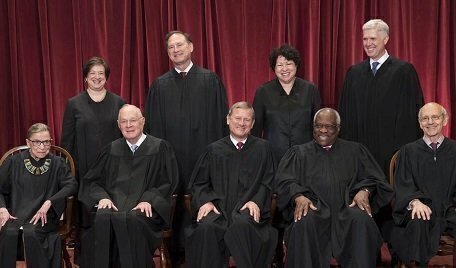In a story ths week from The Atlantic, National Constitution Center president and CEO Jeffrey Rosen explains how the Supreme Court might have found common ground in asserting the relevance of the Fourth Amendment in the electronic age, in a cellphone privacy case.
 On Wednesday, the Supreme Court heard what could become the most important electronic-privacy case of the 21st century. The justices considered whether the government, without a warrant, can effectively trace our movements in public for months on end by demanding 127 days of the geolocational data—known as cell-site location information—that mobile phones beam out 24 hours a day. During the argument, it was encouraging to see two justices with very different perspectives—Justices Sonia Sotomayor and Neal Gorsuch—make passionate arguments for why allowing these kinds of mass searches of our digital effects would be as invasive and unreasonable as the hated general warrants that helped spark the American Revolution. It’s possible, therefore, that Carpenter v. United States may continue a welcome recent trend: Liberal and conservative justices on the Court, by broad bipartisan margins, are insisting on translating the Fourth Amendment to the Constitution into the digital age.
On Wednesday, the Supreme Court heard what could become the most important electronic-privacy case of the 21st century. The justices considered whether the government, without a warrant, can effectively trace our movements in public for months on end by demanding 127 days of the geolocational data—known as cell-site location information—that mobile phones beam out 24 hours a day. During the argument, it was encouraging to see two justices with very different perspectives—Justices Sonia Sotomayor and Neal Gorsuch—make passionate arguments for why allowing these kinds of mass searches of our digital effects would be as invasive and unreasonable as the hated general warrants that helped spark the American Revolution. It’s possible, therefore, that Carpenter v. United States may continue a welcome recent trend: Liberal and conservative justices on the Court, by broad bipartisan margins, are insisting on translating the Fourth Amendment to the Constitution into the digital age.
To read more, go to: https://www.theatlantic.com/politics/archive/2017/11/bipartisanship-supreme-court/547124/







